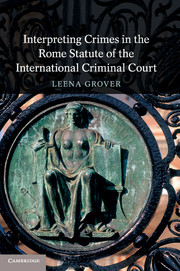Book contents
- Frontmatter
- Dedication
- Contents
- Foreword
- Acknowledgements
- 1 Introduction
- 2 The state of the art
- 3 Guiding interpretive principle
- 4 Challenges to the principle of legality
- 5 Operationalizing the principle of legality
- 6 Custom as an aid to interpretation
- 7 Internal indicia of codification
- 8 External indicia of codification
- 9 The Vienna Convention (1969) and aids to interpretation
- 10 Conclusions
- Bibliography
- Index
- References
1 - Introduction
Published online by Cambridge University Press: 05 November 2014
- Frontmatter
- Dedication
- Contents
- Foreword
- Acknowledgements
- 1 Introduction
- 2 The state of the art
- 3 Guiding interpretive principle
- 4 Challenges to the principle of legality
- 5 Operationalizing the principle of legality
- 6 Custom as an aid to interpretation
- 7 Internal indicia of codification
- 8 External indicia of codification
- 9 The Vienna Convention (1969) and aids to interpretation
- 10 Conclusions
- Bibliography
- Index
- References
Summary
Introduction
Interpretation is central to the practice of law. Sometimes a legal victory or defeat turns on the meaning a judge attributes to a single word in a legal text. The stakes may be low or incredibly high. For example, the International Court of Justice (ICJ) in its Genocide Decision (2007) held that the killing of approximately 7,000 Muslim men in Srebrenica between 13 and 15 July 1995 was an act of genocide and that Serbia was responsible for failing to prevent and punish the individuals involved. For conduct to qualify as genocide in a legal sense, the victim group must be protected by the Convention on the Prevention and Punishment of the Crime of Genocide (1948) (Genocide Convention). Accordingly, the judges had to satisfy themselves that the victims formed whole or ‘part’ of a national, ethnical, racial or religious ‘group’.
The parties disputed inter alia whether the death of 7,000 Muslim men satisfied this element of the crime. Given the gravity of genocide, does the killing of 7,000 men result in the destruction of ‘part’ of a group? If the argument is that the number of people forming ‘part’ of the group is substantial in a quantitative sense, should this be assessed in absolute terms or relative to the size of the whole group? On this point, can ‘group’ be defined in geographically limited terms even if large diasporas of persons exist who share the same nationality, ethnicity, race or religion as the victim group? Ultimately, one important justification for the ICJ’s finding that genocide occurred in Srebrenica was its interpretation of the words ‘part’ and ‘group’.
- Type
- Chapter
- Information
- Publisher: Cambridge University PressPrint publication year: 2014



